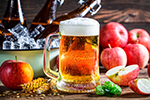
We've domesticated dogs, cats, and livestock, but did you know we've gotten good at domesticating yeast? Belgian scientists the genome sequences of 157 industrial yeast strains and they all arose from just a few ancestors. In fact, our cultivation of those yeast have made them incapable of surviving in nature.
The earliest literate people left the first surviving evidence of humans domesticating yeast. They're the Sumerians, who lived in the Fertile Crescent, in modern day Iraq. Evidence that they used barley to make beer are found on pottery with residue of beer fermentation.
Human selection and breeding of yeast have allowed them to thrive in man-made environments. In the recent study, scientists learned from sequencing all 157 strains that these industrial yeast fell into five groups; Asian strains such as those used to produce sake, and yeast for wine and bread, and two groups for making beer.
The beer yeasts showed more genetic adaptations, and can be subdivided based on geography. For example the ones in the US split off from those in the United Kingdom sometime between 1607 and 1637. This correlates with the establishment of a brewery in Massachusetts Bay Colony.
Since beer yeast spend almost all their time engaged in beer fermentation they are more diverse, but they're also less resistant to stress and lose the ability to form spores because they no longer need to survive in nature. On the other hand, many wine yeast spend most of their time in and around vineyards or the guts of insects and only engage in wine fermentation for a short period of time. So they're closer to yeast found in the wild.
The next time you crack open a brew, think of the amazing history in your hands.
More Information
The Beer Archaeologist
By analyzing ancient pottery, Patrick McGovern is resurrecting the libations that fueled civilization...
Uruk
Uruk was one of the most important cities (at one time, the most important) in ancient Mesopotamia. According to the Sumerian King List, it was founded by King Enmerkar sometime around 4500 BCE...
Sweetness: Brewing Sugars & How To Use Them
Sugars add strength to beer without bulking up the body. John Palmer conducts a survey of sweetness to help you choose when to use sugar and which sugar to use. From Belgian candi sugar to xylose, it's all here...